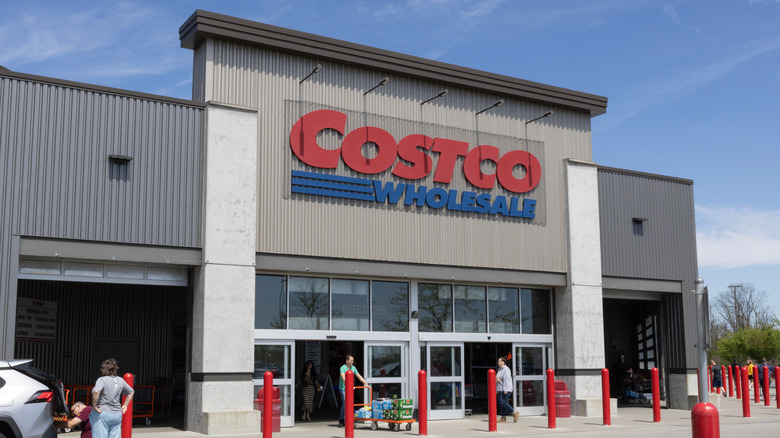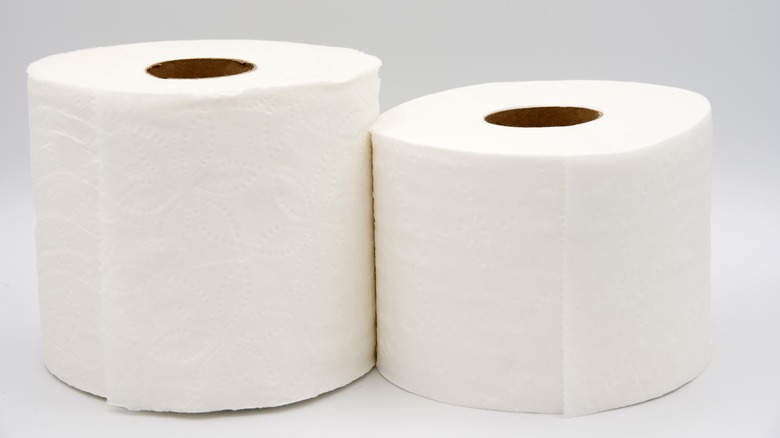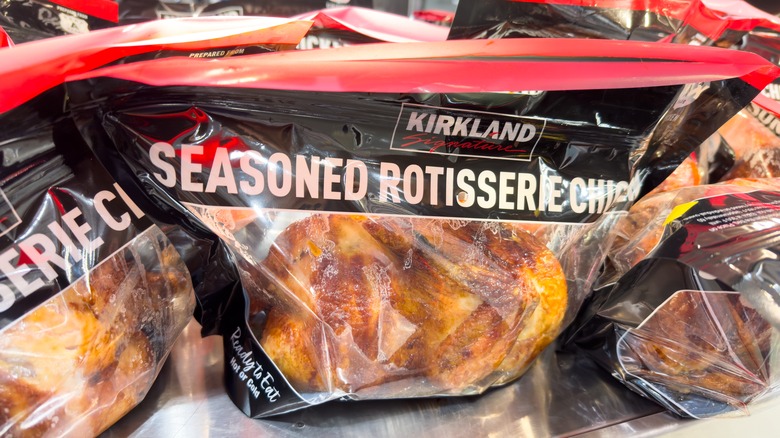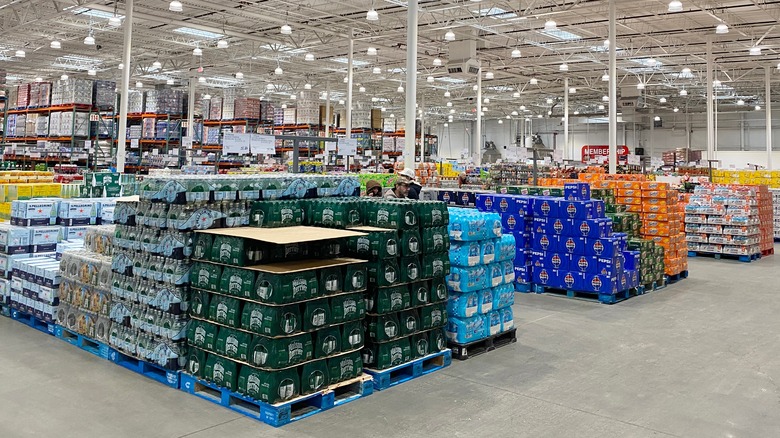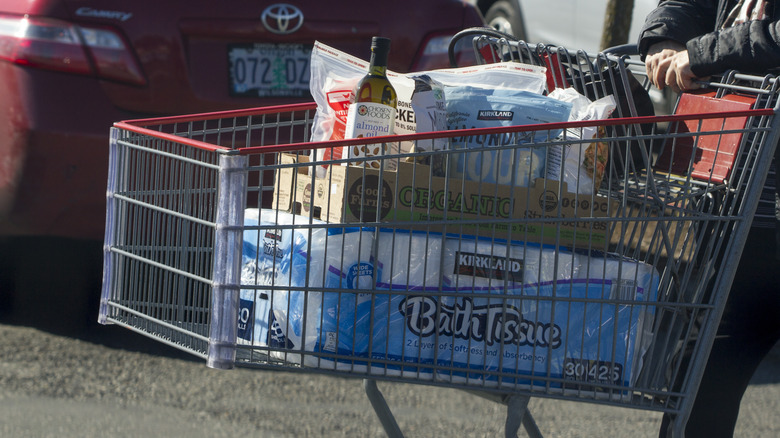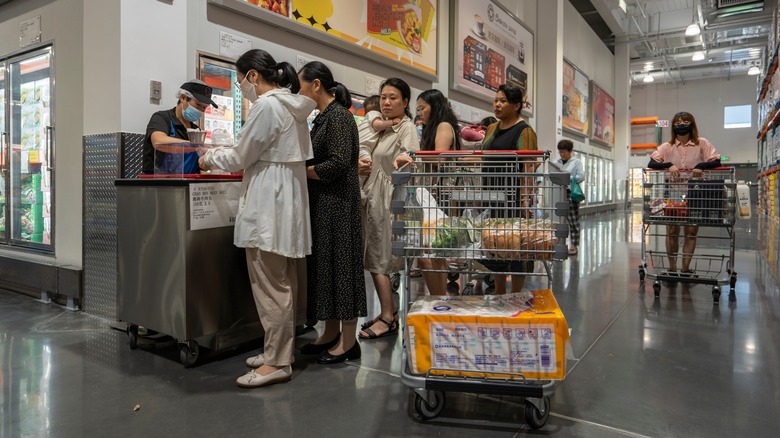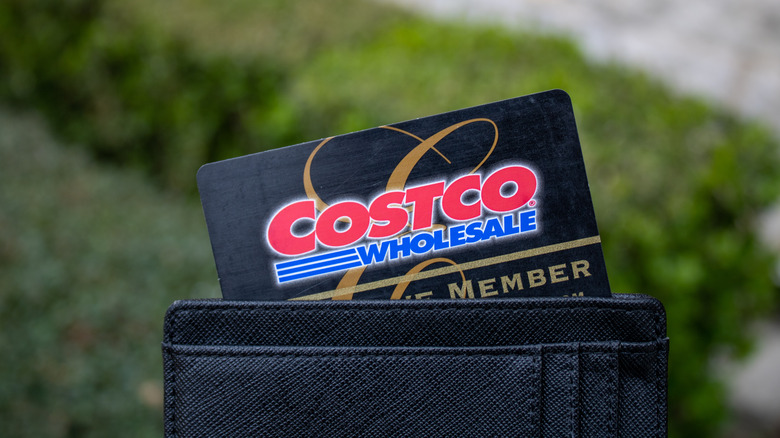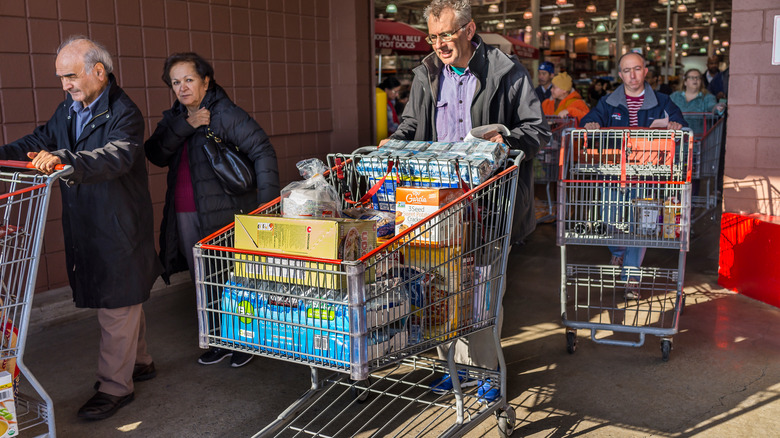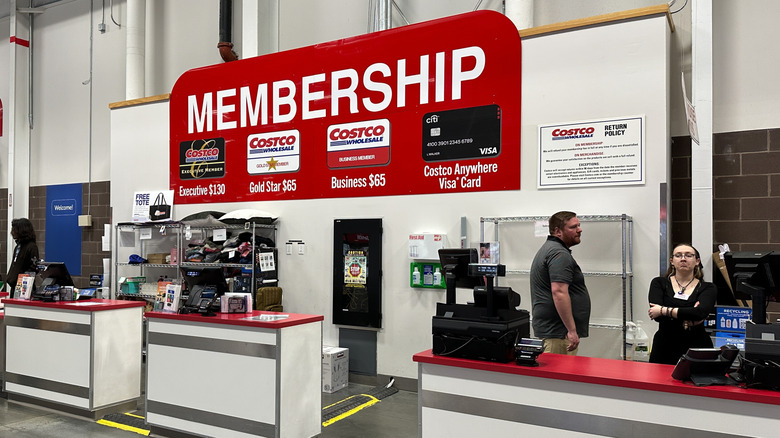9 Costco Shopping Red Flags You Should Never Ignore
There's something deeply satisfying about a Costco haul. A tray of croissants bigger than your toddler, 48 rolls of toilet paper you absolutely needed, and a bottle of olive oil large enough to refill a lamp. It's the kind of place where deals feel obvious and hard to resist.
But here's the thing: Not every purchase is quite as smart as it looks. Costco's value-driven reputation is well-earned, but it also works in its favor. Shoppers trust the brand. They assume the bulk pricing is always better. They believe that if it's in the warehouse, it must be a deal. That's not always true. Between clever product placement, subtle price strategies, and shopper psychology, even seasoned Costco regulars can get tripped up. Some pitfalls are easy to spot, while others take a bit of digging.
This list walks through the biggest red flags to watch out for, especially if you're trying to stick to a budget or avoid buying three liters of something you'll regret. It's not about avoiding Costco. It's about shopping well. Because bulk regret? That stuff doesn't fit in the pantry.
Shrinkflation is affecting product sizes
That jumbo-sized Costco deal you always grab? It might not be quite as jumbo as it once was. Shrinkflation is when product sizes quietly decrease while prices stay the same — or even rise. It's a subtle tactic, but it's becoming more common across grocery stores, and yes, even in bulk-buy giants like Costco. At a warehouse where value is the core promise, this trend undermines the deal you think you're getting.
Take juice bottles that used to be 64 ounces but are now 59, snack packs that contain fewer chips, or paper towel rolls that look the same but have shorter sheets. It's especially tricky with multipacks, where packaging hasn't changed but the individual items inside have been trimmed. Because Costco sells in bulk, the perception of value can hide these changes more easily than at traditional supermarkets.
It's not just Costco. Even McDonald's Filet-O-Fish probably looks different than you remember. Manufacturers are driving these cuts industry-wide in response to inflation and ingredient costs. But shoppers still need to be vigilant. The best way to protect yourself? Compare unit prices. Look at net weights and serving sizes. If something seems off, it probably is. Just because it fills your cart doesn't mean you're getting more. Shrinkflation turns good value into a hidden price hike — unless you catch it.
High sodium in rotisserie chicken
It's a Costco classic. That hot, ready-to-eat rotisserie chicken for just $4.99 has become a dinner hero for busy households. Affordable, filling, and easy to grab on the way out, it feels like a no-brainer.
But if you're watching your health, especially your sodium intake, it's worth looking a little closer. Perhaps one of the facts about Costco's rotisserie chicken you never knew is that a single 3-ounce portion of it contains around 460 milligrams of sodium. That's nearly 20% of the recommended daily maximum. And let's be honest, most people eat well over that portion size in one sitting. Add in sides or sauces, and the numbers creep up fast.
For individuals managing high blood pressure, kidney conditions, or heart disease, that salt load isn't ideal. Even if you don't have a medical condition, regularly eating high-sodium foods can catch up with you. And it's not just the chicken — many of Costco's prepared and ready-to-heat meals carry similar nutritional baggage, often relying on sodium and preservatives to enhance shelf life and flavor. That doesn't mean you have to ditch the deal entirely. But consider balancing it with fresh, low-sodium sides or choosing it less frequently. A good price doesn't always mean it's good for you, especially if it becomes a habit.
Center aisles encourage impulse buys
You walk into Costco for paper towels and leave with a kayak. Sound familiar? That's not bad luck; it's how the warehouse is designed to work. Large, high-impact displays near the front of the store are filled with limited-time products: garden furniture, luxury appliances, novelty decorations, or oversized toys. These items often seem exciting or exclusive, making you feel like you need to act now or else you miss out entirely. That fear of missing out is exactly what drives the sale.
These impulse buys might look like smart deals on the surface, but they're often high-margin, non-essential items. One shopper told USA Today she walked in for toilet paper and walked out with a $23,000 hot tub. While that's extreme, even a few unplanned extras — a blender, a jacket, or a novelty food pack — can send your receipt total soaring.
It's not that these items are never worth it. But when they're unplanned and emotionally driven, they can derail your budget fast. The best approach is to pause before you buy. Ask yourself if this was something you came in for or if the display just got you in the moment. Many of these items will return in a future season or show up later at a discount. Impulse purchases are part of Costco's appeal, but they don't need to be part of your financial regret.
Bulk buys don't always save money
Buying in bulk at Costco can seem like a savvy financial move. The allure of lower per-unit prices is tempting, but it's essential to consider the hidden costs that may accompany these purchases. Perishable items, such as fresh produce, dairy, and baked goods, often have shorter shelf lives and are among some of the grocery items to avoid buying in bulk. Purchasing these in large quantities increases the risk of spoilage before consumption, leading to waste and negating any perceived savings.
There's also the psychological aspect of overconsumption. Having large quantities of a product readily available can lead to increased usage, diminishing the cost-effectiveness of buying in bulk. For instance, a family might consume snacks more rapidly simply because they are abundantly stocked. Moreover, the upfront cost of bulk buying can strain your budget. Spending more money at once, even for items that are used regularly, can impact cash flow and financial flexibility. To make bulk buying truly economical, assess your household's consumption patterns, storage capabilities, and budget constraints. It's crucial to evaluate whether the bulk purchase aligns with your actual needs and financial situation.
Free samples can persude hungry shoppers
Costco is famous for its generous free samples, and it's easy to see why people love them. They feel like a bonus — a reward for showing up. But those little bites do more than just satisfy your curiosity. They're one of the most effective marketing tools in the building.
Sampling changes how people shop. The act of trying something for free creates a subtle psychological shift. Suddenly, you're not just considering the product; you've engaged with it. Your senses are involved. It tastes good. It feels generous. And now, you're far more likely to toss it in the cart. If you're hungry while shopping, this effect ramps up significantly. Hunger makes you more impulsive, more willing to justify unplanned purchases, and more focused on immediate rewards. That's why shoppers who arrive without eating tend to leave with more in their carts — and not just food.
Costco often uses samples to introduce new or seasonal products, especially ones you didn't plan on buying. That's where the real trap is. To avoid overspending, eat beforehand, shop with a list, and give yourself a buffer for one or two impulse items — not 10. Samples aren't evil. But they're not neutral either. Recognize the strategy, and you'll stay in control.
The executive membership isn't worth it for everyone
Costco's Executive Membership sounds like a smart upgrade — until you do the math. It costs twice as much as the standard Gold Star option. For that extra fee, you get a 2% reward on most Costco purchases. That might sound like free money, but there's a catch: You need to spend over $3,000 a year just to break even on the upgrade. Anything less than that, and you've effectively paid extra for the same access.
That's the reason how often you buy groceries plays a big role. For large families or business owners who shop frequently and spend big, that threshold is easy to hit. In those cases, the Executive tier can be worth it, especially if you're also using Costco's services like travel bookings or insurance add-ons, which sometimes come with additional perks for Executive members. But if you're a smaller household, a casual shopper, or someone who mostly picks up groceries and basics every few weeks, it's a different story. You're unlikely to earn back the cost, and that reward check might end up being far less impressive than you hoped.
The good news? Costco offers a safety net. If your rewards fall short, you can request a refund for the difference. Still, the smarter move is to assess your average annual spend upfront. Don't pay extra for a benefit you're unlikely to use. The Executive badge might look premium, but if it's not saving you money, it's just a pricier version of the same card.
Not every Kirkland product is a hidden gem
Kirkland Signature has built a strong reputation for delivering quality at a lower price. For many shoppers, it's a trusted go-to, whether it's pantry staples, household goods, or everyday essentials. But not everything with that bold black-and-red label lives up to the hype. Take the now-discontinued Kirkland Light Beer. Sold in bulk, it looked like a good deal, but the taste reviews were brutal. Many shoppers openly mocked it, and the backlash was strong enough that Costco quietly pulled it from shelves.
It's not the only miss. Kirkland-branded body soap, certain snack items, and even some frozen meals have left customers underwhelmed. Common complaints include bland flavor, unusual textures, or simply not measuring up to familiar national brands. For a label that often collaborates with top manufacturers, the inconsistency can be surprising.
That's why it's smart to do a little digging before buying Kirkland items in bulk. Some are absolute steals. Others? Not so much. One size doesn't fit all, especially when it comes to personal care and food, where there are numerous Kirkland products with low-quality ingredients. Reading customer reviews or trying a single unit before committing to a 24-pack can save you money and disappointment. Costco's house brand does deliver on value, but assuming everything under the Kirkland name is a guaranteed win is a mistake. Each product deserves its own scrutiny.
Too much stock can be a problem in itself
We've already talked about how bulk buying can come with hidden costs. But even when it doesn't hit your wallet directly, it can still take a toll on your space — and your sanity. Bulk goods take up room. And unless you have a basement, spare pantry, or garage storage setup, all that extra stock has to go somewhere. That might mean cluttered hallways, overflowing cupboards, or food crammed into every inch of freezer space. At a certain point, it stops feeling like smart planning and starts feeling like chaos.
Even non-perishables become a hassle if you can't store them properly. Stacking canned goods behind cereal boxes, stuffing paper towels under beds, or rotating frozen meat between drawers isn't just inconvenient — it makes you less likely to use what you bought. Things get buried, forgotten, or simply go off because you didn't know they were there.
And all that clutter can affect more than your storage space. Constant visual mess adds mental load. It makes everyday tasks feel more frustrating, not more efficient. So before you commit to a cart full of bulk buys, ask yourself a simple question: Do I have room for all this? If the answer is no, or even "sort of," that deal might not be as practical as it looks.
Abusing the return policy can get your membership revoked
Costco's return policy is famously generous, and for most members, it's part of the appeal. You can return almost anything with or without a receipt, often long after the purchase date. It feels like a safety net that makes trying new products risk-free.
But there's a limit to that generosity. Behind the scenes, Costco tracks return activity. If a member consistently returns high-value items, abuses the 90-day return window for electronics, or brings back worn and used products with suspicious frequency, it raises red flags. And when those red flags stack up, Costco may take action — up to and including canceling the membership entirely. The reasoning is simple: If a customer is never satisfied, they're not a good fit. And from Costco's point of view, the return policy is meant to protect members — not to be treated like a rental system.
The policy exists for genuine problems, not routine abuse. If you find yourself returning things often, it's worth asking why. Using the system too freely is one of the Costco rules you can't break, or else it might cost you more than you bargained for. Losing your membership means losing access to every benefit, from discounted groceries to the pharmacy and gas station. While the company will usually refund the membership fee in these cases, the inconvenience is real.
